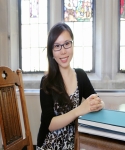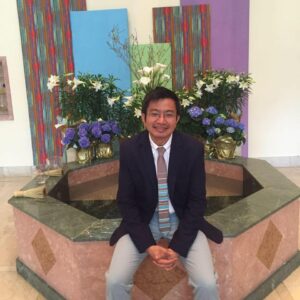 Tony Svetelj, Philosophy
Tony Svetelj, Philosophy
Of course it is not easy to study in a foreign language, with homesickness in a culture where I can call my professors by their first names, and where even the coffee does not taste the same way as it does in my parents’ kitchen. The possibility to study and teach at BC has been an incredible personal opportunity through which I needed to learn again how to be lost and create a distance from my personal convictions on one side, and on the other, how to regain a new security and a different value system, this time from a broader perspective. My time at BC has softened and reshaped my perceptions. I believe more and more that people and cultures that are different from mine have something important to teach me. My immersion into the academic world of BC is only the beginning of a process that starts with these ethical questions: who do I want to become in this world of globalization, and how can I help others from an international perspective?
 Qingyi Yu, Applied Developmental & Educational Psychology
Qingyi Yu, Applied Developmental & Educational Psychology
There is one thing I would always do in my class is to teach my students the idea of diversity and cultural sensitivity, and also of course showing them some scientific research to support my statement. For example, in my “language development” class, I would ask my students to share their own experience of learning a second language, then sharing some of my own English learning experience (such as watching American TV shows, or some cultural shock I experienced when I just moved to U.S.). In addition I would also show them the scientific research evidence of how challenging it would be for people learning a second language when missing the sensitive period of language acquisition. In that case, I feel that students would be more open and sensitive to working with professors whose second language is not English, and it’s also helpful for me to build my authority.
Another thing I would do is to actively respond to my students’ needs and accommodate them with my best effort. For example, if some students are not sure about their final paper, I usually spend a lot of time sitting with them and going through the entire paper line by line, page by page. Also, I distribute quizzes at least 6-7 times to help them become familiar with the exam content. Many students very appreciate this kind of intense mentorship, and it’s also very helpful for them to navigate my class. I guess what students want least is to feel “lost” in a certain class. I hate to admit but some students might blame their failure of class to professor’s accent. So what I do is to make sure almost all the students are on the right track.

Alfred Pang, Theology & Education
My name is Alfred Pang, and I’m currently a PhD candidate in Theology and Education at the School of Theology and Ministry in Boston College. I come from Singapore, and even after having been in Boston for quite a while, I still experience myself as a familiar stranger to the U.S. Yet, I do not speak of myself as a stranger in the deficit. Rather, inhabiting the space of the familiar stranger has become a place from which I teach, a metaphor that shapes my pedagogy as a theological educator. In the words of educational philosopher Maxine Greene, the teacher-as-stranger is positioned “to look inquiringly and wonderingly on the world in which one lives.” Indeed, being the familiar stranger has enabled me to remain curious about the unique lives of students I encounter. It has also challenged me to cultivate a posture of critical self-reflectivity and empathy, allowing for the possibility of multiple perspectives to transform me. Inhabiting the space of the familiar stranger therefore allows me to teach and learn from my students at the intersection of cultural differences.
Furthermore, being the familiar stranger has made me more aware of teaching as a practice of hospitality in theological education. To teach is to create a relational space hospitable to multiple viewpoints from which wisdom can emerge. For this reason, I’m mindful of how we structure a safe classroom environment not to coddle students, but to recognize the vulnerability that comes from learning and hold the discomfort that accompanies critical reflection. I emphasize the importance of respectful dialogue as a matter of care for ideas embodied by people in relationships that have a history. Such dialogue demands deep listening that I encourage my students to practice. I model this listening by first affirming the value of my students’ comments with the statement – “What I’m hearing from you is …” I also work at being pastorally attentive to the layering of voices heard and unheard. The metaphor of the familiar stranger has enabled me to imagine a way of teaching inclusively while embracing ambiguity as an opportunity to deepen self-understanding.